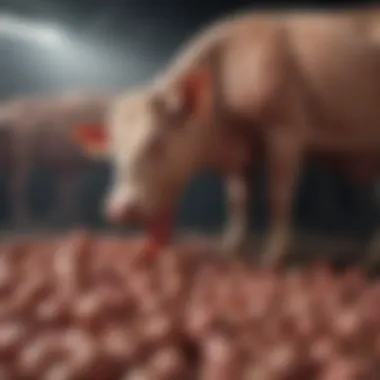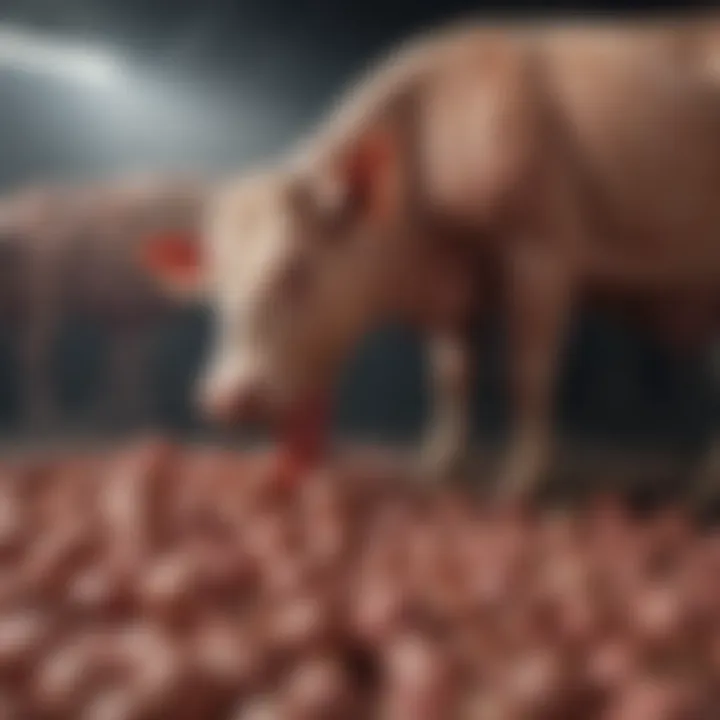Compelling Reasons to Reduce Meat Consumption


Intro
In today's world, the conversation around meat consumption is becoming increasingly vital. With a plethora of research and dialogue surfacing, it’s clear that examining why we consume meat and how it affects us is no longer just a matter of personal choice. It's a matter laced with implications that extend far beyond the dinner plate. From health concerns to environmental degradation, ethical dilemmas involving animal welfare, and economic strain on households and communities, the weight of this topic cannot be overstated.
As we unravel the various threads of this intricate tapestry, it’s essential to highlight that shifting dietary habits holds potential for meaningful change. Research points to transformative benefits not just for individual health, but for the planet itself and for society at large. This article sets out to dissect these imperative reasons to cut back on meat consumption, providing insights that appeal to an audience of students, researchers, educators, and professionals alike.
Each section that follows will delve into extensive findings, revealing just how intertwined our dietary choices are with broader systemic issues. A thoughtful approach to our eating habits is not just advisable; it is, quite frankly, imperative.
Health Benefits of Reduced Meat Consumption
Reducing meat consumption has been a significant topic of discussion recently, primarily because of its potential to improve health outcomes. With rising rates of chronic diseases and an increasing awareness of dietary choices, exploring the health benefits of cutting back on meat can seem imperative. Before diving into the specifics, it's crucial to understand why this matters not just for individual health but also for broader societal well-being.
Impact on Chronic Diseases
Chronic diseases have become a major focus of health discussions around the globe. Here's a closer look at how reducing meat can influence several conditions:
Heart disease
Heart disease remains a leading cause of death worldwide. The connection between high meat consumption and heart disease is well documented. Red meats, in particular, are linked to higher cholesterol levels, which contribute to plaque build-up in arteries. When one transitions to a diet lower in meat, it can lead to a decrease in saturated fats, positively impacting heart health. In fact, many health guidelines now emphasize a diet rich in fruits, vegetables, and whole grains, viewing them as a powerful defense against heart ailments.
"The impact of diet on heart health cannot be overstated; even modest changes can yield significant benefits."
Diabetes
When considering diabetes, the spotlight often falls on carbohydrate intake, but it's essential not to overlook how meat plays a role. Studies suggest that high consumption of red and processed meats is linked to an increased risk of type 2 diabetes. Switching to plant-based proteins can improve insulin sensitivity and help manage blood sugar levels. This change doesn’t mean sacrificing taste; rather, it can open up a new world of flavorful alternatives.
Obesity
Obesity is another chronic disease that has been on the rise, affecting millions globally. Diets heavy in meat, particularly processed meats, can lead to weight gain, often due to their high calorie count and low fiber content. On the flip side, embracing a diet lower in meat and richer in plant-based ingredients tends to be more filling, thus assisting with weight management. People often find they can satisfy their cravings with vegetables, legumes, and whole grains without the excess calories that come with meat.
Nutritional Considerations
While discussing the decline in meat consumption, it's vital to consider alternative nutritional sources:
Protein sources
Protein is essential for maintaining muscle mass and overall health. Contrary to popular belief, one can obtain adequate protein without relying heavily on meat. Sources such as beans, lentils, chickpeas, and nuts offer plant-based protein while also being rich in fiber, vitamins, and minerals. In diets where meat is reduced, these protein alternatives can help maintain energy levels and muscle health, showing that cutting back can indeed be a nutritious choice.
Vitamins and minerals
Meat, especially red and processed types, is often lauded for its iron and B vitamins. However, diversifying your diet by incorporating a variety of plant-based foods can provide these nutrients effectively. Dark leafy greens, seeds, and fortified cereals can meet iron needs, while grains, legumes, and fruits can supply B vitamins. By broadening dietary horizons, individuals can discover numerous alternatives to support their health without meat's disadvantages.
Digestive health
Finally, digestive health is another cornerstone of well-being significantly impacted by meat consumption. Diets high in meat tend to lack fiber, leading to gastrointestinal issues such as constipation. Plant-based foods are typically rich in fiber, promoting regularity and a healthy gut microbiome. A gradual reduction in meat consumption allows for an increase in fiber intake, helping many experience improvements in digestion and overall gut health.
Environmental Implications of Meat Production
Understanding the environmental implications of meat production is crucial in the broader conversation about sustainable diets. Meat production isn't just a matter of personal preference; it has significant effects on our planet's health. From the resources utilized in raising livestock to the emissions generated throughout the process, the inquiry into meat consumption's environmental footprint unveils a tapestry of interconnected issues.
One of the primary concerns centers around greenhouse gas emissions. These gases contribute to climate change, and livestock farming has a notable role in this scenario. Reducing meat consumption means less demand for livestock, which could lead to significant reductions in these harmful emissions.
Greenhouse Gas Emissions
Livestock contributions
Livestock farming accounts for a sizable portion of the world’s greenhouse gas emissions. Cattle, especially, are significant contributors due to their digestive process, which produces methane—a potent greenhouse gas. In fact, the Food and Agriculture Organization (FAO) reported that livestock, including cattle, sheep, and goats, can contribute nearly 14.5% of all human-made emissions. The key characteristic of livestock contributions lies in their long-term impact on climate change. This contributes to the pressing need for a more focused approach towards meat consumption, as less meat means fewer animals raised and, subsequently, less methane emitted. The uniqueness of this situation is that shifting dietary habits can provide a direct avenue for individuals to impact climate responses positively.
Comparative analysis with plant-based diets
When we draw a comparison between the greenhouse gas emissions from livestock and those from plant-based diets, it becomes clearer why reducing meat intake is beneficial. Studies show that plant-based diets can reduce carbon footprints significantly. For instance, a shift from a meat-heavy diet to a plant-based one could decrease emissions by up to 70%. This finds strength in the fact that plants require fewer resources, including land and water, to produce calories compared to livestock.
However, it's important to remember that not all plant-based food options are created equal. The environmental impact varies widely among different crops and agricultural practices. Nevertheless, the overarching takeaway is that embracing a plant-based diet can markedly diminish one's environmental footprint, creating a more sustainable world.
Land and Water Utilization


Land and water utilization represents another layer of the environmental concerns associated with meat production. Globally, livestock farming consumes vast amounts of both resources. Deforestation rates, for example, have been significantly driven by land clearing for grazing and feed crops. The direct link between meat demand and rising deforestation rates can’t be ignored. When forests are cleared, they not only lose their ability to sequester carbon but also disrupt local ecosystems.
Deforestation rates
The uniqueness of deforestation rates related to livestock farming lies in its scope. In countries like Brazil, large areas of the Amazon rainforest have been cut down for cattle ranching. The impact is staggering, as this not only accounts for loss of wildlife habitats but also accelerates climate change. The perception that meat consumption can support sustainable development must be reconsidered when placed against the backdrop of such environmental degradation.
Water scarcity issues
Water scarcity is another pressing issue tied to meat production. Raising animals for food requires enormous amounts of water, from the water the animals drink to the water needed to grow their feed. In regions suffering from droughts or where water resources are already limited, this practice exacerbates the scarcity problem.
Moreover, the key characteristic of this water usage extends beyond just quantity; it's also about the quality of water available. Runoff from livestock farms can lead to pollution in local waterways, affecting ecosystems and human health alike. Cutting down on meat consumption can indirectly alleviate some pressure on these water resources.
"Adopting a diet lower in animal products is not just a personal choice but a collective necessity if we aim to preserve our planet's future."
Ethical Considerations Surrounding Meat Consumption
The ethical considerations surrounding meat consumption raise vital discussions, particularly as more individuals reflect on the implications of their dietary choices. It isn’t just about taste or convenience; the moral dimensions of how animals are treated and the cultural factors influencing our food habits must be acknowledged. By understanding the ethical aspects of meat consumption, we begin to see a clearer picture of our food systems and the responsibilities we owe to ourselves and the creatures around us.
Animal Welfare
Factory farming practices
In factory farming, the scale of operations leads to practices that often prioritize production efficiency over animal welfare. This system is characterized by high stocking densities, where animals are kept in confined spaces with minimal room to move. Such conditions contribute to various welfare issues, such as stress, disease, and even unnatural behaviors due to lack of proper environment.
The focus on output — increasing meat production to meet consumer demand — results in a troubling trade-off. While factory farming allows meat to be more affordable and accessible, the significant downsides regarding animal suffering and the ethical dilemmas they pose cannot be overlooked. For many, this representation of modern agriculture paints a stark contrast to ideals of humanity and compassion.
One unique feature of factory farming is the reliance on antibiotics to manage illness among densely populated livestock. This not only raises ethical questions regarding animal treatment but also brings into focus public health issues related to antibiotic resistance. Without a careful reconsideration of these farming methods, the current system runs the risk of compromising the well-being of both animals and humans alike.
Ethics of slaughter
The ethics of slaughter deals with the moral implications of how animals are killed for food. This subject triggers heated debate, especially as consumers become more aware of animal sentience and the pain they can experience. The modern practices often lack transparency, leaving consumers in the dark regarding how their food is processed.
Countries vary widely in their slaughter regulations, with some enforcing humane methods while others remain lenient or even neglectful in their approach. The key characteristic here is the pursuit of humane slaughter as a potential compromise between cultural practices and ethical standards. Advocates for humane treatment emphasize better solutions, such as stunning methods that decrease suffering before death.
One unique feature of the ethical discussion around slaughter is the rise of certification programs. These initiatives aim to ensure meat comes from sources that adhere to higher welfare standards. This provides consumers a choice to support more ethical practices but also results in a spectrum of understanding and varying adherence to such practices across regions.
Cultural Perspectives
Tradition vs. modern ethics
Traditions surrounding meat consumption are often deep-rooted in cultural identity and historical practices. In many societies, the act of preparing and sharing meat is tied to community gatherings or celebrations, presenting a challenge when juxtaposed with modern ethical concerns.
The clash between tradition and contemporary ethical thinking invites a deep introspection. Traditional beliefs might emphasize the importance of meat as a central part of diet, while modern ethics pushes for a reconsideration of these practices in light of animal welfare and environmental impact. The dilemma often lies in reconciling these differing perspectives; can traditions evolve without losing their essence?
A notable feature in this discussion is the emergence of ethical meat alternatives, reflecting a willingness to adapt without completely abandoning heritage. Some communities are finding to marry tradition with modernity, showcasing how it's possible to respect cultural practices while also pursuing more ethical alternatives.
Global dietary shifts
Recently, there’s been a notable shift towards vegetarianism, veganism, and plant-based diets across the globe. This change arises not only from health awareness but also a growing consciousness about animal rights, environmental impacts, and social justice. Countries that once had a heavy reliance on meat are seeing their populations advocating for reduced meat consumption, prompting cultural shifts in dietary norms.
The growth of global dietary shifts speaks to one key characteristic: adaptability. People now openly discuss their food choices, allowing their values and ethical stances to influence what they eat. This break from tradition allows society to tackle the often overlooked ethical dilemmas surrounding meat consumption.
As individuals transition towards plant-based diets, there is also an acknowledgment of the complexities involved in changing long-standing habits. One unique feature of this global perspective is the role of community and social norms in supporting dietary changes. Through community initiatives and public discourse, people are increasingly paving the way for ethical consumption to become a normative way of life.
The merging of ethics and dietary habits can empower individuals to reconsider their choices, ultimately reshaping our food systems for the better.
Economic Factors Influencing Dietary Choices
Understanding the economic aspects of our dietary choices is crucial in the ongoing discussion about meat consumption. Economic factors not only shape personal eating habits but also reflect larger systemic issues in food production and distribution. These factors can dictate what foods are accessible, affordable, and sustainable, making them essential to consider when we talk about reducing meat intake.
Meat Prices and Affordability
Market trends
Market trends play a pivotal role in how meat prices fluctuate, affecting consumer choices. Over the past few years, there has been a noticeable shift in meat prices, mainly due to various external factors. Supply chain disruptions caused by pandemics or geopolitical tensions have pushed many to reevaluate their shopping lists. One key characteristic of these market trends is the rising popularity of plant-based diets, which often leads to higher demand for alternative protein sources. This creates a 'push and pull' effect in the market that could actually lower the cost of these healthier options in the long term.


The unique feature of this development is its potential to transform traditional eating patterns. With increasing availability of meat substitutes such as Beyond Meat or Impossible Foods, consumers may find themselves embracing alternatives that are both nourishing and budget-friendly. This change could further encourage lower meat consumption, impacting our overall dietary landscape.
Budget-friendly alternatives
When it comes to making budget cuts, finding alternatives to meat becomes a necessity for many families. Budget-friendly alternatives such as beans, lentils, and chickpeas can be incredibly affordable sources of protein that don’t break the bank. The substantial cost savings without sacrificing nutritional value is one reason they are gaining traction among consumers.
An essential characteristic of these alternatives is their versatility. They fit into various culinary contexts across different cultures, making them an appealing choice for anyone wanting to reduce meat intake. The unique aspect here is that many of these alternatives not only come with a lower price tag but are also rich in nutrients, thus supporting healthier eating habits.
Agricultural Subsidies
Government policies
Government policies that support certain agricultural industries significantly shape dietary choices. Subsidies for livestock farming, for instance, can create an environment where meat is consistently cheaper than plant-based options, skewing consumer choices in favor of meat. Knowing this, it's evident that agricultural policy is not trivial; it directly influences food affordability and availability.
While these policies can bolster the economy in the short term, they may also contribute to unsustainable farming practices that impair long-term food security. An insightful feature of these policies is that they often neglect the broader implications of our food systems, such as environmental impact and health outcomes.
Impact on sustainable farming
The impact of agricultural subsidies on sustainable farming cannot be overstated. When financial backing prioritizes conventional meat production, it can undermine efforts towards more sustainable agricultural practices. This becomes a pressing concern as consumers increasingly look for responsible food choices.
The key aspect to consider here is the stark contrast between conventional and sustainable farming methods. Sustainable practices tend to be more resource-efficient and environmentally friendly, yet they often lack the funds and support necessary to thrive. Understanding this discrepancy can be eye-opening for consumers, encouraging them to advocate for reforms that better align government policies with sustainable dietary choices.
"By aligning government priorities with sustainability, we can shift not just markets but also ingrained habits in our diets."
This understanding of economic factors can aid individuals in making informed choices about reducing meat consumption, contributing to healthier lifestyles, environmental sustainability, and ethical eating practices. As consumers become more aware of market dynamics, they can steer their choices toward foods that align not just with health but with a vision for a more equitable food system.
Societal Trends Toward Reduced Meat Consumption
The conversation surrounding meat consumption has undergone a significant transformation. A growing number of individuals are turning to plant-based diets, and societal trends reflect this shift. By examining these trends, we can uncover the underlying reasons that drive this change, along with the benefits and possible challenges associated with reducing meat in our diets. Understanding these factors is crucial for grappling with the larger implications of our food choices—not just for individual health but also for the world as a whole.
Rise of Plant-Based Diets
Market growth
The surge in the plant-based market indicates a notable transition in consumer preferences. This is not merely a fad but an evolving landscape where vegetarian and vegan foods are becoming mainstream. Sales of plant-based products have skyrocketed, demonstrating that a significant portion of the population is willing to invest in alternative diets. Companies are adapting by creating savory, satisfying options as they realize there is a burgeoning market for these items.
One key characteristic of this market growth is its variety. With everything from meatless burgers to dairy-free cheeses available, people are not feeling deprived anymore. They can enjoy their favorite foods while making environmentally conscious choices. This shift benefits the masses by expanding dietary options while simultaneously promoting sustainable practices in food production.
However, it's important to note that not all plant-based products hold equal nutritional value. Some meat substitutes may be excessively processed or high in additives. Thus, when considering the rise of plant-based diets, consumers should remain judicious in their selections to ensure they are making the healthiest choices.
Innovative food products
Another dimension of this trend is the emergence of innovative food products designed to replicate the taste and texture of meat. Companies are pushing the envelope of food science, utilizing ingredients like pea protein and other legumes to create items that are surprisingly close to the real deal. Such innovations help bridge the gap between plant-based diets and traditional meat consumption, catering to even the most discerning palates.
The key characteristics of these products include their palatability and the development of textures that mimic meat, making them more attractive to a wider range of consumers. This not only appeals to those who are curious about reducing meat in their diets but also to die-hard meat lovers who may be hesitant to make the switch. The unique feature lies in their ability to entice through flavor without compromising values related to health or ethics.
Yet, the advent of these new products does come with concerns, such as their nutritional composition and the environmental impact of processing. While some versions can be beneficial, it's crucial to assess their health worthiness in the context of overall dietary needs.
Influence of Social Media
Public awareness campaigns
Social media has emerged as a powerful tool for inciting change and raising awareness about dietary choices. Numerous public campaigns have leveraged platforms like Instagram and Facebook to spread information about the benefits of reducing meat consumption. By sharing relatable content, graphic infographics, or compelling personal stories, these campaigns have encouraged individuals to reconsider their eating habits.
An essential aspect of these campaigns is that they often highlight the positive impacts on health and the environment, creating a narrative that resonates with many. When users see the compelling stories of everyday people adopting plant-based diets and thriving, it encourages them to reflect on their own dietary patterns.
Despite its effectiveness, one drawback could be the oversimplification of complex issues related to diets. Consumers may find themselves overwhelmed by the barrage of information and at times could decide based on trends rather than informed choices. Therefore, critical thinking becomes vital as people engage with these campaigns.
Viral challenges and movements
Finally, viral challenges and movements originating on social media have stirred considerable interest around reducing meat consumption. Initiatives like Meatless Mondays and various month-long plant-based challenges have caught the attention of users internationally, making healthy eating a trending topic.
These trends showcase a community spirit, as participants encourage each other and share their experiences. The key characteristic of these movements is their ability to draw in participants from diverse backgrounds and interest levels, fostering a sense of belonging and shared purpose. They make reducing meat a more socially acceptable, if not a stylish, choice.
However, such movements can sometimes lead to extreme dietary choices or unsustainable practices. Individuals might jump on bandwagons without fully understanding the implications, thus highlighting the necessity of balance and informed choices amidst enthusiasm.


In summary, societal trends increasingly favor reduced meat consumption due to an amalgamation of market evolution, innovation in food products, and the profound reach of social media. These forces intertwine to shape a landscape that values health, environmental consciousness, and culinary creativity, all while requiring careful navigation of potential pitfalls.
Personal Responsibility and Dietary Choices
Taking a hard look at our dietary choices reveals much about our personal responsibilities within the web of health, ethics, and the planet. As individuals, we have a profound ability to influence our well-being through what we eat, making it crucial to discern how meat consumption weighs into the larger picture. While the pressure from cultural norms and the masses can feel overwhelming, it’s essential to understand that every food choice carries significance—not just for the individual, but for societies and ecosystems as well.
Informed Decision Making
Research and Awareness
To navigate the complex landscape of nutrition, one must rely on robust research and awareness. It’s not merely about grabbing the latest diet fad from social media; rather, it’s about delving into studies that elucidate the relationship between meat intake and various health outcomes. Through this lens, individuals can examine peer-reviewed articles, regional dietary guidelines, and case studies, revealing how excessive meat consumption can trigger health issues like heart disease and diabetes.
A critical characteristic of being well-informed is the ability to discern credible sources. This choice fosters a more holistic outlook—one that sees beyond the marketing jargon of the latest burger alternative. The unique feature of such meticulous scrutiny lies in its capacity to empower. For instance, an individual who understands the nutritional profiles of different proteins can make better choices tailored to their own health goals.
However, it also has its downsides. Sometimes, too much information can lead to confusion or even paralysis by analysis, inhibiting action instead of prompting it. The key takeaway is that research and awareness serve as one’s compass through the often murky waters of dietary choices, offering clarity and direction.
Critical Thinking on Food Choices
Coupled with awareness is the often-overlooked skill of critical thinking on food choices. This involves actively evaluating not only what we eat, but why we eat it. It's about questioning the immediate pleasure of a meal against its long-term ramifications on health and the environment. The key characteristic here is the ability to consider the broader impacts of one's eating habits, from animal welfare to carbon footprints.
This aspect of personal responsibility is potent. It encourages culinary exploration—replacing a meat-based option with an intriguing legume dish or a hearty vegetable stir-fry. By doing so, individuals expand their culinary repertoire while still satisfying their hunger.
The unique feature of this approach lies in its flexibility. Rather than sticking to rigid diets, critical thinking enables a more adaptable mindset regarding food. However, a potential drawback could be the risk of overthinking simple meals. It’s a delicate balance between mindful choices and enjoyment in eating.
Setting Realistic Goals
Gradual Reduction Techniques
When deciding to cut back on meat, gradual reduction techniques pave a more palatable road to change. Instead of an abrupt transition, easing into a reduced meat lifestyle often proves more sustainable. This might look like choosing meat-free Mondays or replacing one meal a week with plant-based alternatives.
This gradual approach allows taste buds to adjust while providing a sense of agency over one’s own health. It often turns into an exploratory journey where discovering new recipes and ingredients adds spice to life.
However, there can be challenges here as well. Sometimes, individuals may feel they’re not achieving their goals fast enough, leading to frustration. Yet, the benefit of gradual reduction is that it tends to be less overwhelming and fosters long-term commitment to healthier habits.
Benefits of Flexibility
Ultimately, the benefits of flexibility cannot be overstated. When one adopts an adaptable approach to dietary choices, it grants permission to modify and evolve eating habits without the pressure of perfection. This means enjoying a favorite dish, even if it’s meat-based, while actively seeking ways to incorporate more plant foods overall.
Flexibility in dietary goals supports mental health, as the rigidity of strict diets can lead to feelings of guilt or failure. Instead, aiming for a balanced diet, where meat is an occasional guest rather than the main course, allows for a lifestyle that feels approachable.
Nevertheless, the drawback here lies in potential complacency. Without a commitment to reducing meat consistently, one could slip back into heavier consumption patterns. Striking the right balance between indulgence and responsible choices is fundamental.
The crux of personal responsibility in dietary choices lies in the understanding that every bite taken has its implications, not only on personal health but also on the world beyond our plates.
Finale: Reevaluating Meat in Our Diets
Reevaluating meat in our diets means taking a good hard look at not just what we eat, but why we eat it. Throughout this article, we’ve explored a multitude of facets related to the reduction of meat consumption. Each aspect intertwines to present a compelling case not just for individual health, but also for the well-being of our planet and the treatment of animals.
Diving into health, it was clear that reducing meat can mitigate risks associated with chronic diseases. The findings highlight how a plant-forward approach can lower the chances of heart disease, diabetes, and obesity. Embracing this way of eating doesn’t mean compromising on nutrition; instead, it opens avenues for discovering diverse protein sources, vitamins, and minerals from whole foods.
From an environmental viewpoint, the production of meat significantly contributes to greenhouse gas emissions. The comparative analyses show that plant-based diets demand less land and water, factors that are increasingly strained in our world. This overarching issue calls for not just individual changes, but a cultural shift that demands sustainable practices in agriculture.
Ethically, meat consumption raises serious questions regarding animal welfare. The practices seen in factory farms bring to light the treatment of animals and the ethical implications of slaughter methods. Societal norms regarding food continue to evolve, and an increasing number of people are beginning to recognize the importance of aligning dietary habits with ethical considerations.
Economically, the conversation surrounding meat is equally vital. The interplay between meat prices, agricultural subsidies, and sustainable food systems reveals a complex web that impacts not just individual choices but also the broader economy. By understanding these economic factors, consumers can make informed decisions that not only benefit their wallets but support sustainable farming practices.
The increasing trend toward plant-based diets points to a significant behavioral shift in how society considers food. Social media’s role in highlighting this shift cannot be overlooked; it serves as a platform for spreading awareness and fostering community support for dietary changes.
Thus, as we wrap up, it's clear that reevaluating meat consumption isn’t merely a personal journey; it’s a collective challenge. Acknowledging the deep interconnections between health, environment, ethics, and economy empowers individuals to take actionable steps. Let’s recognize the opportunity to reshape our plates, not just for our benefit but for future generations.
"The choices we make today will shape the world we live in tomorrow.”
Synthesizing Perspectives
Synthesizing perspectives involves integrating various points addressed throughout the article into a cohesive narrative that highlights their significance. Each section—health, environmental impact, ethics, economy, societal attitudes—contributes to a larger understanding of meat consumption and its implications.
This synthesis shows how interconnected these issues are. For example:
- Health benefits from reducing meat consumption enhance individual well-being and contribute to lower health care costs for society.
- The environmental benefits of shifting to plant-based diets can alleviate the pressure on natural resources, leading to improved ecological health, which ultimately supports public health as well.
- Ethical shifts in perception about animal welfare can fuel demand for more humane farming practices, which could, in turn, inspire agricultural policy changes.
To bring all these threads together, one must consider the transformative potential of individual choices. As students, researchers, educators, and professionals explore these concepts further, they begin to comprehend a more holistic view of dietary impacts. It is not just about cutting back on meat; it’s about fostering a culture that values sustainability, health, and ethical considerations.



